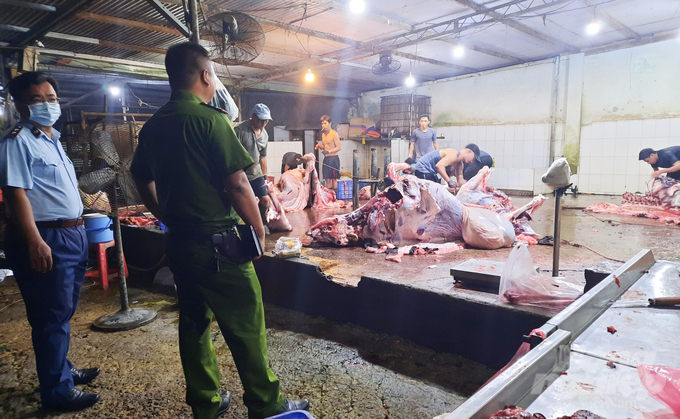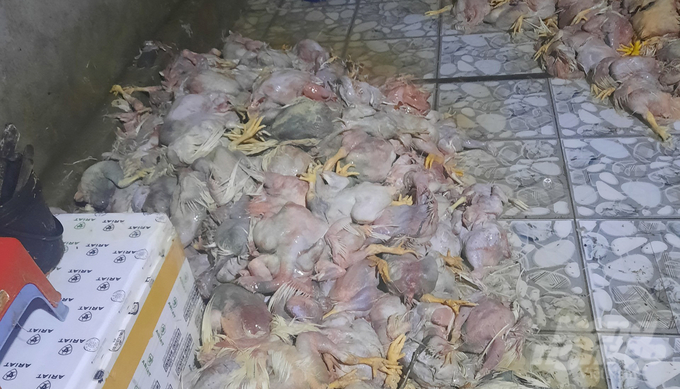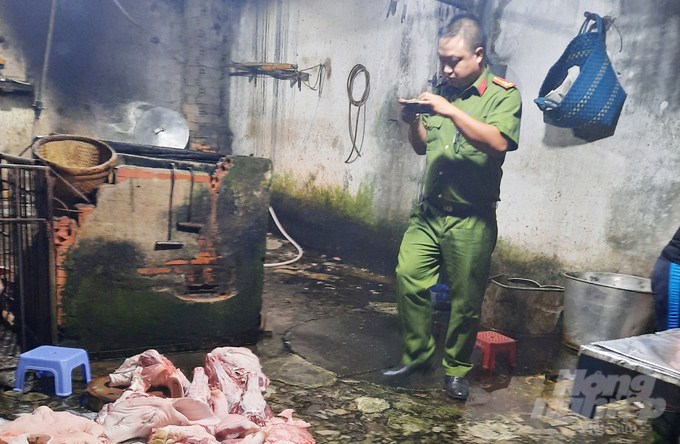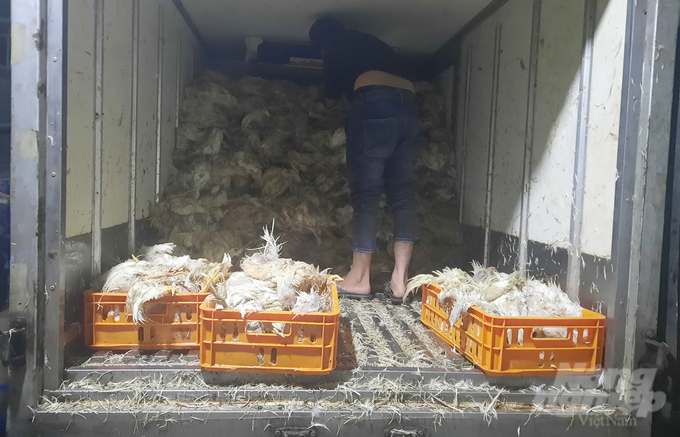June 1, 2025 | 12:47 GMT +7
June 1, 2025 | 12:47 GMT +7
Hotline: 0913.378.918
June 1, 2025 | 12:47 GMT +7
Hotline: 0913.378.918

Dong Nai province's interdisciplinary team continuously caught illegal slaughterhouses red-handed. Photo: Le Binh.
Being a livestock “capital”, Dong Nai is also known as a hot spot for illegal animal slaughtering. This is one of the reasons why disease control here is not guaranteed and people's health is thus affected. Eliminating unlicensed slaughterhouses is not only the task of Dong Nai's agricultural sector alone but also a common request from all levels and sectors.
It is fair to say that the work of denouncing and handling illegal livestock and poultry slaughterhouses in Dong Nai has been carried out very effectively. However, many illegal slaughterhouses still operate regardless of the consequences, blatantly challenging legal regulations. Perhaps the word “battle” is the most fitting to describe the struggles against the problem of illegal slaughterhouses in Dong Nai.
To detect and handle illegal pig slaughterhouses, the authorities must face dangers. It is not a rare case when owners of illegal slaughterhouses are uncooperative and even resist fiercely when suddenly inspected by an interdisciplinary team.
The interdisciplinary team normally consists of many units such as the Department of Environmental Police from the provincial police force, Dong Nai Sub-department of Livestock Production and Animal Health, Department of Market Management, and People's Committees at all levels.
To owners of illegal slaughterhouses, this inspection work implies that the animal health sector is the focal point or informer. Therefore, many times these subjects targeted their attacks at officers of the Dong Nai Sub-department of Livestock Production and Animal Health.

If not detected early, these rotten chickens will be "enchanted" and consumed at spontaneous markets, collective kitchens or roadside shops. Photo: Le Binh.
“We are constantly being called by these people. They sometimes curse or even threaten our lives. Because of the mission, we accept these attacks. We reassure each other to see it through to the end. However, there are cases where we have to ask the police for intervention before things go too far," said Nguyen Truong Giang, Director of Dong Nai Sub-department of Livestock Production and Animal Health.
In many districts, not only the officers of the Livestock Production and Animal Health Station and the District Department of Agriculture and Rural Development but also the armed forces could not avoid fierce resistance from the owners of illegal slaughterhouses.
“At the time we were on duty, most of the facilities were occupied. Following the reflexes and direction of the facility owner, these people used tools such as knives, hammers, and logs for defense and threats. Fortunately, these individuals soon realized their wrongdoing after being counseled. We also had to notify the local authorities to make a record and have appropriate remedial measures," said Lieutenant Duong Duc Loc, reconnaissance officer of the Department of Environmental Police (Dong Nai Provincial Police).

With the drastic intervention of forces, departments and branches, Dong Nai hopes to soon eliminate the situation of slaughterhouses illegally operating as it has been for many years. Photo: Le Binh.
According to Dong Nai Department of Agriculture and Rural Development, despite continuously destroying unlicensed facilities, the whole province still has 142 illegal slaughterhouses. Bien Hoa city holds the largest number with 42 establishments existing, followed by Trang Bom, Nhon Trach, Tan Phu, Vinh Cuu, Dinh Quan, Cam My and Thong Nhat districts.
These establishments often operate at night, constantly change locations and do not follow any rules, so they are difficult to detect. These lawbreakers arranged many layers of warnings. As soon as there was a move from the authorities, they immediately destroyed evidence or tried to escape. In particular, at the end of the year, the demand for livestock products is greater, so the “battle” against illegal slaughterhouses becomes even more intense and dangerous.

Dong Nai will strongly handle illegal slaughterhouses with many different measures, both managing the consumption stage and applying technology to trace product origin. Photo: Le Binh.
Since the beginning of 2021, Dong Nai People's Committee has approved the scheme for a network of centralized animal slaughterhouses in the province until 2025, with a vision to 2030. Unlicensed slaughterhouses are considered a problem that needs to be eliminated so that Dong Nai can develop its economy through a centralized slaughter system, stabilize society and ensure consumer health.
“Punishing or eliminating illegal slaughterhouses is just going one step behind. If there is demand, there will be supply. Therefore, we will strongly handle the demand part first, strongly controlling the consumption stage. Hopefully, when market controls are tightened, these illegal establishments will also be cast out," said Vo Van Phi, Vice Chairman of Dong Nai People's Committee.
Translated by Samuel Pham

(VAN) Several scientists and farmers are experimenting with soil treatment in some key durian-growing regions such as Cai Lay (Tien Giang), Dak Song, Gia Nghia, and Dak R’lap (Dak Nong).
/2025/05/25/4127-3-073637_820.jpg)
(VAN) Thanks to the promotion from an FAO-implemented project, vegetable production in greenhouses in Moc Chau has seen strong development, from 1.5 hectares in 2021 to nearly 50 hectares in 2024.

(VAN) FAO has recently supported USD 140,000 to implement the project 'Risk mitigation human-animal interface risks through disease control initiatives in pig farming.'

(VAN) The People's Committee of Tra Vinh province has approved an adjustment to the investment policy for the Green Hydrogen Plant project, increasing its area to approximately 52.76 hectares.
![Reducing emissions from rice fields: [2] Farmers’ commitment to the soil](https://t.ex-cdn.com/nongnghiepmoitruong.vn/608w/files/news/2025/05/05/dsc08881jpg-nongnghiep-140632.jpg)
(VAN) Clean rice cultivation model in Thuong Tan commune, Bac Tan Uyen district, is assisting local residents in achieving sustainable agriculture by substantially reducing costs, increasing productivity, and protecting the environment.

(VAN) At the conference to disseminate Resolution No. 68, AgriS introduced its digital agricultural ecosystem and reaffirmed its commitment to accompanying the Government in promoting private sector development and sustainable agriculture.

(VAN) 'Blue Ocean - Blue Foods' initiative is designed to restore marine ecosystems and establish sustainable livelihoods for local communities by cultivating a minimum of 1,000 hectares of cottonii seaweed in the first three years.